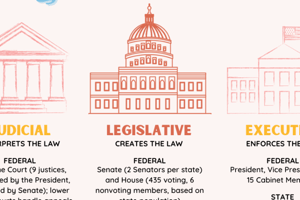Podcast
Questions and Answers
According to the Constitution, the main responsibility of the Executive Branch is to enact new laws.
According to the Constitution, the main responsibility of the Executive Branch is to enact new laws.
False (B)
A presidential candidate needs a supermajority of the popular vote to win the presidency.
A presidential candidate needs a supermajority of the popular vote to win the presidency.
False (B)
According to the Twenty-Second Amendment, a President can serve a maximum of two terms, totaling 10 years, if they initially assumed office mid-term.
According to the Twenty-Second Amendment, a President can serve a maximum of two terms, totaling 10 years, if they initially assumed office mid-term.
False (B)
The President's power to nominate Supreme Court judges is absolute and does not require consent from any other governmental body.
The President's power to nominate Supreme Court judges is absolute and does not require consent from any other governmental body.
If the House of Representatives recommends impeachment then the Supreme Court will conduct a trial.
If the House of Representatives recommends impeachment then the Supreme Court will conduct a trial.
The number of members in the House of Representatives is directly proportional to the population of each state, whereas the Senate has a fixed membership of 50 members per state to ensure equal representation.
The number of members in the House of Representatives is directly proportional to the population of each state, whereas the Senate has a fixed membership of 50 members per state to ensure equal representation.
A Senator's term lasts six years, allowing them to focus on long-term policy impacts and maintain closer ties with their constituents compared to Representatives, who serve an indefinite term.
A Senator's term lasts six years, allowing them to focus on long-term policy impacts and maintain closer ties with their constituents compared to Representatives, who serve an indefinite term.
While both Senators and Representatives must reside in the state they represent, only Senators are required to have been naturalized U.S. citizens for at least 9 years before assuming office.
While both Senators and Representatives must reside in the state they represent, only Senators are required to have been naturalized U.S. citizens for at least 9 years before assuming office.
The Vice President serves as the President of the Senate, possessing the power to cast a deciding vote in the event of a tie, whereas the House of Representatives is led by the Senate Majority Leader.
The Vice President serves as the President of the Senate, possessing the power to cast a deciding vote in the event of a tie, whereas the House of Representatives is led by the Senate Majority Leader.
The Speaker of the House has no term limit, which enables him or her to serve for an unlimited time.
The Speaker of the House has no term limit, which enables him or her to serve for an unlimited time.
Flashcards
U.S. Senate
U.S. Senate
The chamber of Congress with 100 members.
Vice President
Vice President
The presiding officer of the Senate.
U.S. House of Representatives
U.S. House of Representatives
The chamber of Congress where membership is based on state population.
Speaker of the House
Speaker of the House
Signup and view all the flashcards
Residency Requirement
Residency Requirement
Signup and view all the flashcards
Executive Branch
Executive Branch
Signup and view all the flashcards
Electoral Votes
Electoral Votes
Signup and view all the flashcards
Oath of Office
Oath of Office
Signup and view all the flashcards
Impeachment Process
Impeachment Process
Signup and view all the flashcards
Presidential Departments
Presidential Departments
Signup and view all the flashcards




